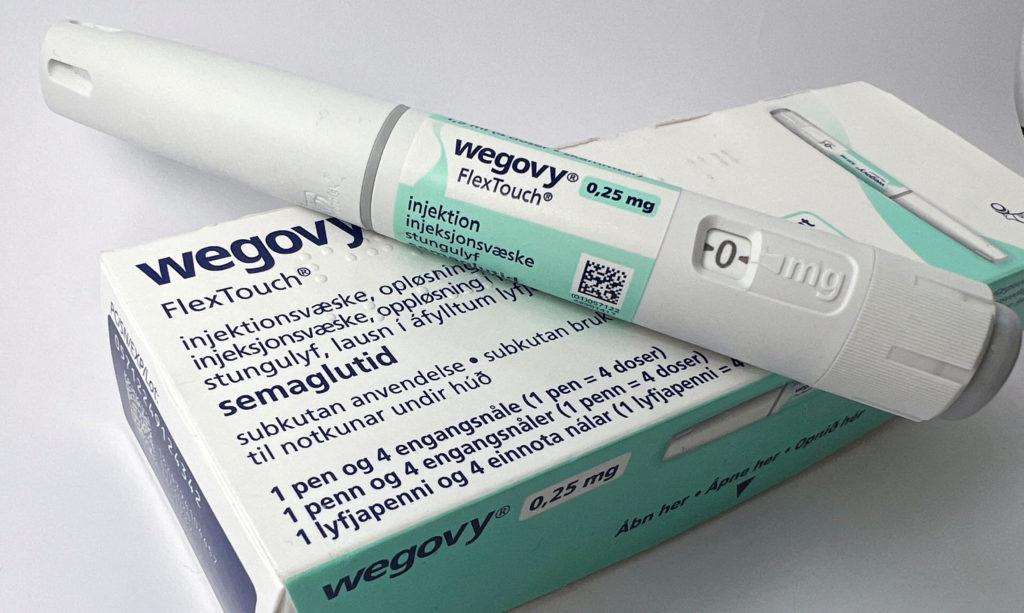Medical News Today Article By Katharine Lang on April 10, 2024 — Fact checked by Amanda Ward
As the prevalence of obesity increases worldwide, the need for effective treatments for related health conditions is becoming more urgent.
In the United States, more than 42% of adults have obesity, and around 35 million adults have type 2 diabetes. For the many people with both conditions, the risk of heart failure is high.
The most common form of heart failure in people with obesity and type 2 diabetes is heart failure with preserved ejection fraction (HFpEF). Up to half of those with type 2 diabetes will develop HFpEF, which results in a severely impaired quality of life and reduced life expectancy.
Despite the prevalence of HFpEF, there are currently no effective treatments to target obesity-related HFpEF in people with type 2 diabetes.
Now, research suggests that semaglutide (Wegovy), a glucagon-like peptide-1 (GLP-1) receptor agonist that was developed as a treatment for type 2 diabetes and is an effective weight-loss medication, may also help reduce symptoms of HFpEF in people with obesity and type 2 diabetes.
The study appears in The New England Journal of Medicine.
Richard Wright, MD, board-certified cardiologist at Providence Saint John’s Health Center in Santa Monica, CA, not involved in this research, commented on the trial results for Medical News Today. He told us that:
“This is an important trial which reinforces the concept that patients with the [symptoms] of heart failure syndrome can be further benefited by administration of a drug that was originally developed to reduce blood sugar and has now emerged as an important way to reduce cardiovascular and heart failure events, while simultaneously improving patient’s functional capacity and sense of well-being.”
Effective weight-loss treatment may reduce heart disease risk
Semaglutide— marketed as Wegovy or Ozempic — is a GLP-1 agonist that helps regulate blood sugar, and is used as a treatment for people with type 2 diabetes.
It also promotes weight loss, and was approved by the Food and Drug Administration (FDA) in 2021 for long-term weight management and as a treatment for people with obesity.
Studies have found that it may also lower cardiovascular risks for people with obesity. One previous trial found that one year of treatment with semaglutide significantly decreased the 10-year risk of atherosclerotic cardiovascular disease.
In March 2024, the FDA approved Wegovy to help reduce the risk of cardiovascular death, heart attack, and stroke in adults with heart disease who have obesity or overweight.
Following a recent study, in which researchers found that semaglutide reduced symptoms and physical limitations and improved exercise function in people with HFpEF and obesity, they decided to test the drug in people with HFpEF, obesity and type 2 diabetes.
Less weight loss, but greater symptom relief in type 2 diabetes
The researchers conducting the current trial recruited 616 participants at 108 sites in 16 countries. All participants had HFpEF, a body mass index (BMI) of 30 or more, and type 2 diabetes. They randomly assigned them to once-weekly injections of semaglutide (2.4 milligrams) or placebo for 52 weeks.
All participants were on other medications, including diuretics, renin-angiotensin system blockers, and beta-blockers, with around one-third of them also on mineralocorticoid receptor antagonists and sodium-glucose cotransporter 2 inhibitors.
The study had 2 primary endpoints — the change in the Kansas City Cardiomyopathy Questionnaire clinical summary score (KCCQ-CSS) and the percentage change in body weight from baseline to week 52.
In addition, the researchers set secondary endpoints of change in 6-minute walk distance, and change in log transformed C-reactive protein — also known as “CRP,” a measure of inflammation — levels from baseline to the end of the study.
Those in the semaglutide group had a larger reduction in heart failure symptoms, with a mean improvement of 13.7 points on the KCCQ-CSS, compared with 6.4 points for the placebo group.
They also lost more weight than those on placebo, with a mean percentage weight loss of 9.8% in the treatment group and 3.4% in the placebo group, and their CRP levels reduced by 42% against 12.8% for the placebo group.
The weight loss in the treatment group was 40% less than participants in the previous trial on patients with heart failure and obesity without type 2 diabetes, but they still showed symptom improvement, as Wright explained to MNT:
“It was expected that semaglutide would lead to weight loss [in] these obese patients. However, despite the rather modest weight loss with the drug in this trial, these patients with preserved ejection fraction heart failure demonstrated clinically significant improvements in quality of life, measures of functional capacity, reductions in important biomarkers including NT proBNP and CRP, and numerically less likelihood of heart failure decompensation.”
Read full article here.

